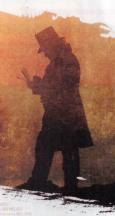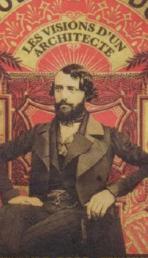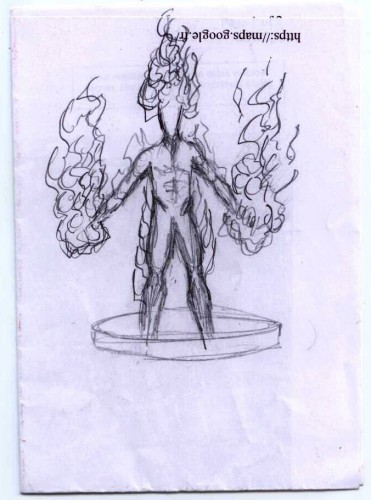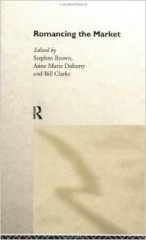jeudi, 30 octobre 2014
Etymologie - Debout-payé
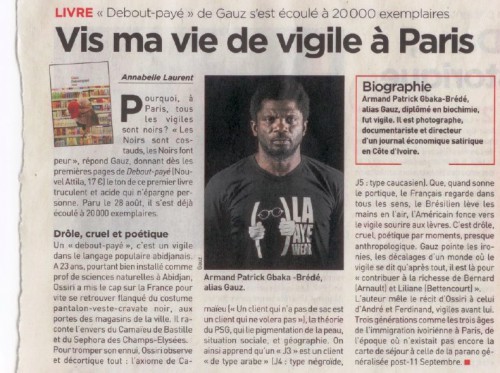
Source : 20 minutes, jeudi 9 octobre 2014
*
> Pour davantage : http://fichtre.hautetfort.com/les-mots-francais.html
07:00 Publié dans Les mots français | Lien permanent | Commentaires (0)
samedi, 25 octobre 2014
Etymologie - Honni soit qui mal y pense
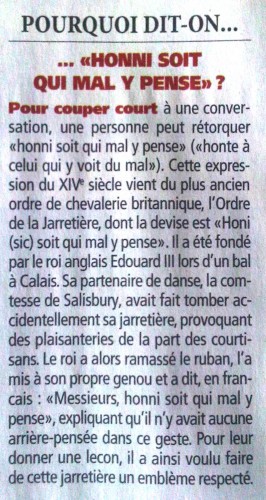
Source : Direct Matin, 28 février 2013
*
> Pour davantage : http://fichtre.hautetfort.com/les-mots-francais.html
07:00 Publié dans Les mots français | Lien permanent | Commentaires (0) | Tags : honni soit qui mal y pense
vendredi, 24 octobre 2014
Etymologie - En connaître un rayon
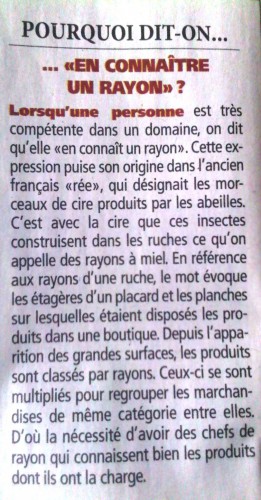
Source : Direct Matin, le 8 mars 2013
*
> Pour davantage : http://fichtre.hautetfort.com/les-mots-francais.html
07:00 Publié dans Les mots français | Lien permanent | Commentaires (0) | Tags : en connaître un rayon
mercredi, 22 octobre 2014
Etymologie - Romantique #3
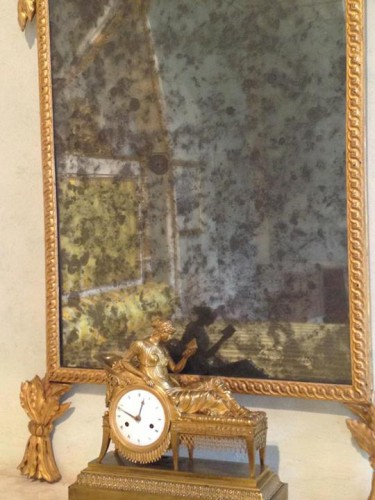
Crédits photographiques Elie Mehdi
Extrait de Romancing the Market, Brown, Doherty & Clarke, 1998, Routledge :
p.2
Like many aesthetic movements, of course, romanticism only really makes sense in terms of what it is not. And the 'not' that romanticism is usually compared to is neoclassicism (allbeit the case for 'realism' is probably sttonger - see Travers 1998).
As the term implies, neoclassicism essentially involved the excavation, establishment, elaboration and enactment of aesthetic ideas derived from ancient Greek and Roman arbiters like Aristotle, Horace, Quintilian and Longinus (Abrams 1993; Barzun 1962). These authorities were assumed to have attained unequalled excellence in their respective spheres of endeavour and thus their writings were regarded as models to which all great art should aspire. Neoclassicism, then, was characterised by conformity, traditionalism, distrust of radical
p.3
innovation and an overwhelming emphasis upon the tried and tested. Its leading eighteenth-century exponents, such as Swift, Dryden, Pope and Goldsmith, stove for elegance, grace, decorum, propriety and adherence to, or refinement of, the 'rules' of the relevant genre. Innovation, admittedly, was by no means depreciated but the primary challenge was to display wit, ease, suavity, sophistication, skill and polish within existing, highly restricted conventions (in drama, the three unities of time, place and action, the closed couplet in poetry, etc.).
As Furst (1969: 15) observes, the authoritarianism of the neoclassical period largely stemmed from an unqualified belief in the powers of the mind, the intellect and, above all, reason. The scientific achievements of the Enlightenment fostered an assumption that all things were knowable and that this knowledge was attainable by means of rational investigation. Just as Newton had shown this to be the case in the physical world, so too the milieux of morals, politics, ethics and art could be systematically examined and their universal 'truths' uncovered, extracted and disseminated.
The adepts of neoclassicism thus attempted to establish the 'laws' of aesthetics, which if properly observed and carefully followed would result in a 'correct' composition, be it musical, literary, dramatic or whatever. 'The Rtist, like the scientist, was expected to operate by calculation, judgement and reason, for... the making of a book was considered a task like the making of a clock' (Furst 1969: 16).
The romantics, by contrast, championed innovation, creativity, iconoclasm, individuality and radical experimentation over traditionalism, refinement, rectitude and the seemly veneration of extant materials, forms, styles or genres (Butler 1981; Cranston 1994). They espoused spontaneity, informality, exuberance, elementalism, naturalism and aboriginal rusticity - as, for instance, in their use of vernacular language, their enthusiasm for 'lowly', 'impolite' or 'common' subjects, and, not least, their unqualified love of nature, landscape and the sheer élan vital of exitence. Conspicuously non-rational perspectives predicated upon visionary, mystical, supernatural, spiritual and otherworldly experiences came to prominence in the romantic period, as did a veritable catalogue of halt, lame and lonely wanderers, noble savages, innocent children, restless phantoms, pastoral panoramas, verdant vistas, sylvan glades, faery grottoes, crumbling ruins, gnarled oaks and, lest you think we've forgotten, golden daffodils. ALthough described with remarkable accuracy, compassion and power, it must be stressed that such 'external' phenomena primarily served to stimulate the inner feelings/reflections/emotions/introspections of the poet, author or creative artist.
Much of romanticism's legacy therefore comprises meditations or reveries on the creator's inner Self, though, as these people were often social misfits, nonconformists or malcontents, it is dominated by melancholic, anxiety-stricken, self-pitying expressions of the inner emotional turmoil of imaginative outsiders. Imagination, in short, coupled with an apocalyptic sense of out-with-the-old-and-in-with-the-new, was the cynosure of the romantics (Barzun 1944; Bowra 1961; Day 1996; Shaffer 1995). Romanticism is nothing less than an 'apocalypse of the imagination' (Bloom 1970a: 19).
p.10
[...] the romantic hero [...] is charismatic, dynamic, exciting, risk-taking, adventurous, outrageous, restless, roguish, swashbuckling, sexy. A bit Byronic perhaps, a tad Don Juanish and Manfred is manifestly its middle name [...]. Like Goethe's Werther, Chateaubriand's René and Musset's Octave, marketing constantly oscillates between profound, almost suicidal melancholy (e.g. the contemporary 'crisis' literature and the perennial complaint that no one takes the discipline seriously) and rampant, well-nigh certifiable megalomania (the broadening debate, periodic paroxysm of 'rediscovery', etc.). The romantic hero may be 'a multiple persona which drew upon images of the aristocrat, the dandy, the womaniser, the sociol and political outcast, and the rebel' (Travers 1998: 18), yet he is no less prone to 'lose a sense of perspective through constant self-observation, self-analysis and self-pity, so that he sinks deeper and deeper into the quagmire of his egocentricity' (Furst 1969: 98). Do they mean us ?
_ _ _
Contributors are Eric J. Arnould, Russel W. Belk, Stephen Brown, Bill Clarke, Anne Marie Doherty, Benoît Heilbrunn, Morris B. Holbrook, Christian Jantzen, Pauline Maclaran, Andrew McAuley, Per Ostergaard, Cele Otnes, Paul Power, Linda L. Price, Barbara B. Stern, Lorna Stevens, Craig J. Thompson, Robin Wensley
_ _ _
Abrams, M.H. (1993), A Glossary of Literary Terms, sixth edition, Fort Worth: Harcourt Brace.
Barzun, J. (1944), Romanticism and the Modern Ego, Boston: Little Brown.
Barzun, J. (1962), Classic, Romantic and Modern, London: William Pickering.
Bloom, H. (1970a), 'The internalization of quest romance', in H. Bloom, The Ringers in the Tower: Studies in Romantic Tradition, Chicago: Univeristy of Chicago Press, 12-35.
Bowra, M. (1961), The Romantic Imagination, Oxford: Oxford University Press.
Butler, M. (1981), Romantics, Rebels and Reactionaries: English Literature and its Background 1760-1830, Oxford: Oxford University Press.
Cranston, M. (1994), The Romantic Movement, Oxford: Blackwell.
Day, A. (1996), Romanticism, London: Routledge.
Furst, L.R. (1969), Romanticism in Perspective: A Comparative Study of Aspects of the Romantic Povements in England, France and Germany, Basingstoke: Macmillan.
Shaffer, E. (1995), 'Secular apocalypse: prophets and apocalyptics at the end of the eighteenth century', in M. Bull (ed.), Apocalypse Theory and the Ends of the World, Oxford: Blackwell, 137-58.
Travers, M. (1998), An Introduction to Modern European Literature: From Romanticism to Postmodernism, Basingstoke: Macmillan.
_ _ _
Romancing the Market
Stephen Brown, Anne Marie Doherty, Bill Clarke
1998
Ed. Routledge
312 pages
http://www.amazon.fr/Romancing-Market-Stephen-Brown/dp/04...
07:00 Publié dans Beaux-Arts, Les mots français, Photographie, Sculpture, Thèse | Lien permanent | Commentaires (0)
mardi, 21 octobre 2014
Etymologie - Romantique #2
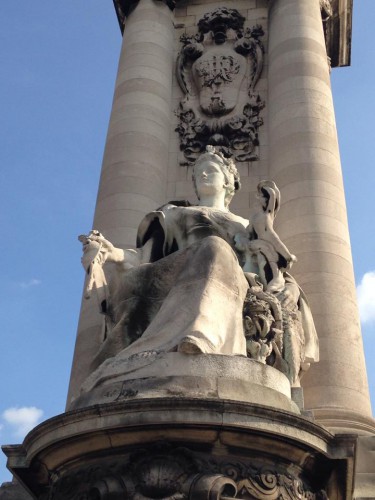
Crédits photographiques Elie Mehdi
Extrait de Romancing the Market, Brown, Doherty & Clarke, 1998, Routledge :
p.1
Two hundred years ago, a brace of young poets, William Wordsworth and Samuel Taylor Coleridge, scandalised polite society when they published the first edition of their poetic manifesto, Lyrical Ballads (Brett and Jones 1991). Inspired, in part, by the emancipatory euphoria that accompanied the unfurling of the French Revolution, and containing such never-to-be-forgotten (once-learnt-by-rote) classics as Tintern Abbey and The Rime of the Ancient Mariner, Lyrical Ballads ushered in a whole new era of Western culture, commonly known as romanticism or the romantic movement (Day 1996).
True, Wordsworth and Coleridge didn't actually employ the term 'romantic' (Furst 1971). The word and its cognates, what is more, were in widespread use prior to 1798 (Sanders, 1996). Indeed, the originality of Lyrical Ballads has also been called into question, as has the extent of the controversy surrounding its publication (Ashton 1996).Nevertheless, it is generally acknowledged that, thankgs in no small part to Wordsworth and Coleridge, the dog days of the eighteenth century witnessed a revolution in aesthetics, in sensibility, in thought. Not only did this represent, as Berlin (1991: 209) rightly records, 'the largest shift in European consciousness since the Reformation', but romanticism is still with us in the shape of our own great '-ism', our -ism in excelsis, the nulli secundus of -isms, postmodernism (Elam 1992; Livingston 1997 ; Readings and Schaber 1993).
p.2
The basic problem with -isms, of cours, is isn't (Brown 1995). That is to say, when it comes to -isms there isn't a single, satisfactory, all-encompassing, universally agreed definition, or even agreement on the fact that there isn't a single, satisfactory, all-encompassing, universally agreed definition of the -ism in question.
Whether it be realism, relativism, conservatism, liberalism, idealism, empiricism, communism, capitalism, fscism, feminism, gnosticism, aestheticism, asceticism, athleticism, mysticism, mesmerism, masochism, modernism, marxism, malapropism or any othe '-ism' that those mad for macaronicism, liable to lexiphanicism or smitten by sesquipedalianism are inclined to conjugate, the only thing that everyone knows for certain is that there is no certainty about the thing everyone 'knows". The ism isn't.
The same is true for romanticism, a subject which has been subject to all manner of competing definitions ranging from Rousseau's 'return to nature", though Pater's 'the addition of strangeness to beauty', to Phelps's 'sentimental melancholy' (see Furst 1971). How, for that matter, can we possibly forget Goethe's contention that 'romanticism is disease' (young Werther has a lot to be sorrowful for), Ker's suggestion that it represents 'the fairy way of writing' (not in this neck of the woods, buster !), and Fairchild's cryptic confabulation that romanticism comprises 'a desire to find the infinite within the finite, to effect a synthesis of the real and the unreal, the expression in art of what in theology would be called pantheistic enthusiasm' (keep taking the tables, sunshine, or the laudanum at least) ?
Aptly described as 'baffingly vague and used in an appallingly large number of different ways in different contexts' (Gray 1992: 251), romanticism is degined in The Oxford Companion to English Literature as :
A literary movement, and profound shift in sensibility, which took place in Britain and throughout Europe... Intellectually it marked a violent reaction to the Enlightenment. Politically it was inspired by the revolutions in America and France... Emotionnaly it expressed an extreme assertion of the self and the value of individual experience together with the sense of the infinite and transcendental... The stylistic keynote of romanticism is intensity, and its watchword is 'imagination".
(Drabble 1995: 853)
_ _ _
Contributors are Eric J. Arnould, Russel W. Belk, Stephen Brown, Bill Clarke, Anne Marie Doherty, Benoît Heilbrunn, Morris B. Holbrook, Christian Jantzen, Pauline Maclaran, Andrew McAuley, Per Ostergaard, Cele Otnes, Paul Power, Linda L. Price, Barbara B. Stern, Lorna Stevens, Craig J. Thompson, Robin Wensley
_ _ _
Ashton, R. (1996), The Life of Samuel Taylor Coleridge, Oxford: Blackwell.
Berlin, I. (1991), 'The apotheosis of the romantic will: the revolt against the myth of an ideal world', in I. Berlin (ed.), The Crooked Timber of Humanity: Chapters in the History of Ideas, London: Collins, 207-37.
Brett, R.L. and Jones, A.R. (1991), 'Introduction', in W. Wordsworth and S.T. Coleridge, Lyrical Ballads, London: Routledge, ixi-liv.
Brown, S. (1995), Postmoderne Marketing, London: Routledge.
Day, A. (1996), Romanticism, London: Routledge.
Drabble, M. (ed.) (1995), The Oxford Companion to English Literature, Oxford: Oxford University Press.
Elam, D. (1992), Romancing the Postmodern, London: Routeledge.
Furst, L.R. (1971), Romanticism, London : Methuen.
Gray, M. (1992), A Dictionary of Literary Terms, Harlow: Longman.
Livingston, I. (1997), Arrow of Chaos : Romanticism and Postmodernity, Minneapolis: University of Minnesota Press.
Readings, B. and Schaber, B. (eds) (1993), Postmodernism Acreoss the Ages: Essays for a Postmodernity That Wasn't Born Yesterday, Syracuse: Syracuse University Press.
Sanders, A. (1996), A Short Oxford History of English Literature, Oxford: Oxford University Press.
_ _ _
Romancing the Market
Stephen Brown, Anne Marie Doherty, Bill Clarke
1998
Ed. Routledge
312 pages
http://www.amazon.fr/Romancing-Market-Stephen-Brown/dp/04...
07:00 Publié dans Beaux-Arts, Les mots français, Photographie, Sculpture, Thèse | Lien permanent | Commentaires (0)
lundi, 20 octobre 2014
Etymologie - Romantique #1
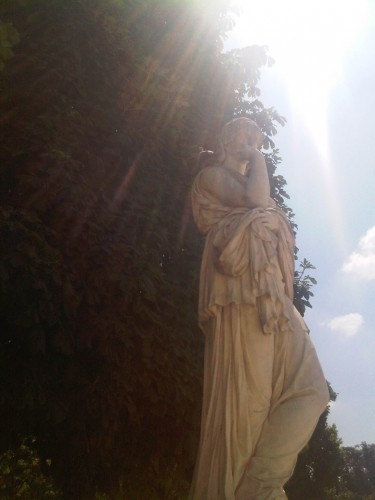
Crédits photographiques Jana Hobeika
Extrait de Romancing the Market, Brown, Doherty & Clarke, 1998, Routledge :
Pré-intro
Two hundred years ago the romantic movement precipitated a revolution in aesthetics, sensibility and thought. The neoclassical ethos of order, rectitude and rationality was replaced by an emphasis on creativity, innovation, individuality, spontaneity and imagination.
Marketing, as an academic discipline, is dominated by neoclassical ideals of dispassionate science, 'truth' and objectivity. The international contributors* to this volume argue for a neo-romantic approach to Marketing scholarship which will invigorate, infuriate and illuminate the discipline. [...]
By way of a prelude p.xviii
In our fragmented, de-centred, hyper-real, ever-accelerating fin de siècle marketing milieu, where mechanistic, technocratic, pseudo-scientific models of analysis, planning, implementation and control no longer seem to 'work', a radically different approach to marketing understanding is urgently required.
For many contemporary commentators, poets, novelists, creative artists and their copious late twentieth-century avatars - journalists, movie makers, television producers, stand-up comedians, etc. - can provide insights into the post-human condition that are as good as if not better than those derived from more established scholarly sources. [...]
p.xix
What's more, the notion that creative writers and artists are blessed with what Ernst Bloch terms 'anticipatory illumination', an ability to articulate the as-yet-inarticulate, to make the inchoate cohere, has been around for a very long time. [...]
Romanticism has been defined in a host of ways, but a central component is the enormous emphasis placed upon the imagination, the inspiration, the inner light of the creative writer and artist. The work of the romantics didn't so much passively reflect as actively illuminate that to which it referred. Illumination, as Abrams rightly observes, is the apotheosis of romanticism.
Illumination, tu be sure, is a wonderful word. Apart from its connection to the romantic movement, it carries connotations of Arthur Rimbaud, secret societies, stained-glass windows, medieval scriptoria, illuminated manuscripts, Welter Benjamin and, Heaven help us, the recent comeback album by 1970s' rock band, Wishbone Ash. For many Britons, moreover, illuminations is evocative of Blackpool, that vulgarian of urbanism, that civitas of the carnavalesque, that municipality of marketing. Blackpool, in many ways, is a perfect metaphor for marketing scholarship. It caome to prominence approximately 100 years ago ; it reached its peak in the late 1950s-early 1960s ; and, according to some authorityies, it is in terminal decline despite increasingly desperate attempts to add to its attraction ('roll up, roll up, Relationship Marketing, the biggest white elephant of the world'). Marketing practice, what is more, has long been characterised by the irreverent, bawdy, candy-flossed, end-of-the-pied, saucy picture postcard, dirty weekend spirit that is embodied, indeed epitomised, by Blackpool ('buy one get one free", "I can't believe it's not butter', 'FCUK' and, naturally, 'Beaver Espana').
p.xx
[...] ... about the romanticism of marketing on St Valentine's Day, of all days. Not only does St Valentine's Day epitomise the commercialisation of love - marketing the romance, so to speak - but the festival commemorates an early Christian priest, who was beheaded in 269CE for conducting the marriage ceremonies of covert lovers, though some say it was because he cured and converted the blind daughter of a Roman official. Yet others maintain that it was Valentine's voluminous outpouring of inflammatory letters and pamphlets during his incarceration - hence the tradition of sending cards - that precipitated the death penalty.
Be that as it may, this combination of decapitation, deception and discourse, with just a frisson of Levittite astigmatisme, cannot fail to send shivers down the spine of late twentieth-century marketing scholars. [...]
_ _ _
* Contributors are Eric J. Arnould, Russel W. Belk, Stephen Brown, Bill Clarke, Anne Marie Doherty, Benoît Heilbrunn, Morris B. Holbrook, Christian Jantzen, Pauline Maclaran, Andrew McAuley, Per Ostergaard, Cele Otnes, Paul Power, Linda L. Price, Barbara B. Stern, Lorna Stevens, Craig J. Thompson, Robin Wensley
** Marxist German philosopher, 1885-1977 > http://en.wikipedia.org/wiki/Ernst_Bloch
_ _ _
Romancing the Market
Stephen Brown, Anne Marie Doherty, Bill Clarke
1998
Ed. Routledge
312 pages
http://www.amazon.fr/Romancing-Market-Stephen-Brown/dp/04...
07:00 Publié dans Beaux-Arts, Les mots français, Photographie, Sculpture, Thèse | Lien permanent | Commentaires (0) | Tags : romantique, romantisme, valentin, saint valentin, blackpool, romanticism
samedi, 04 octobre 2014
Gracile
Petite danseuse
et comédienne
Gracile
et expressive
Gracile : Littér. Qui est délicat, fragile, tout en restant gracieux. Synon. élancé, fin, menu, mince, svelte; anton. épais, gros, massif, trapu.
*
> Pour davantage : http://fichtre.hautetfort.com/les-mots-francais.html
http://www.youtube.com/watch?v=2vjPBrBU-TM
La petite danseuse gracile et expressive s'appelle Maddie Ziegler.
Elle a 12 ans.
Pour plus de vidéos de la petite danseuse et de sa petite sœur
http://www.madmoizelle.com/sia-chandelier-maddie-ziegler-252884
07:00 Publié dans Chanson, Les mots français | Lien permanent | Commentaires (0)
